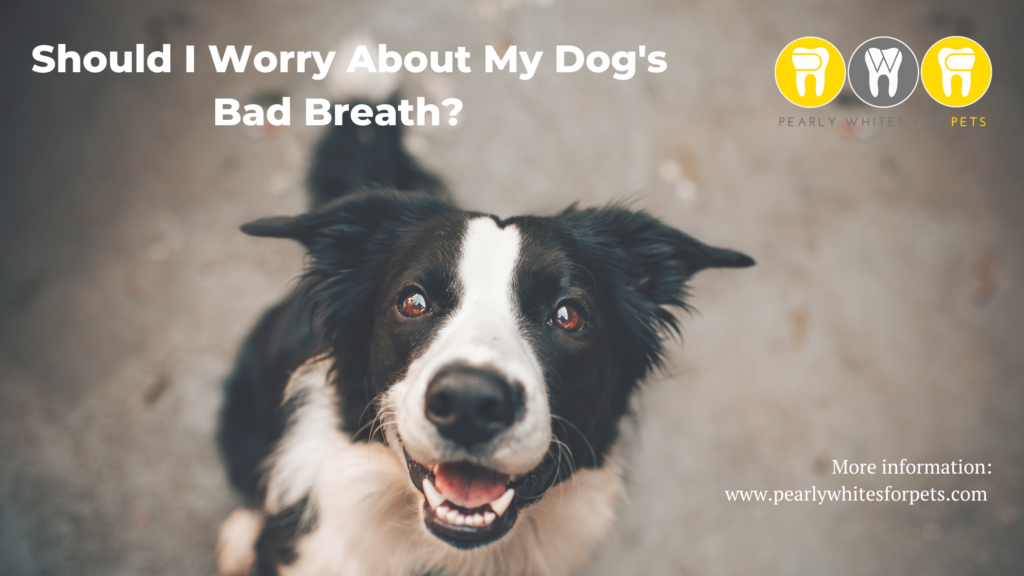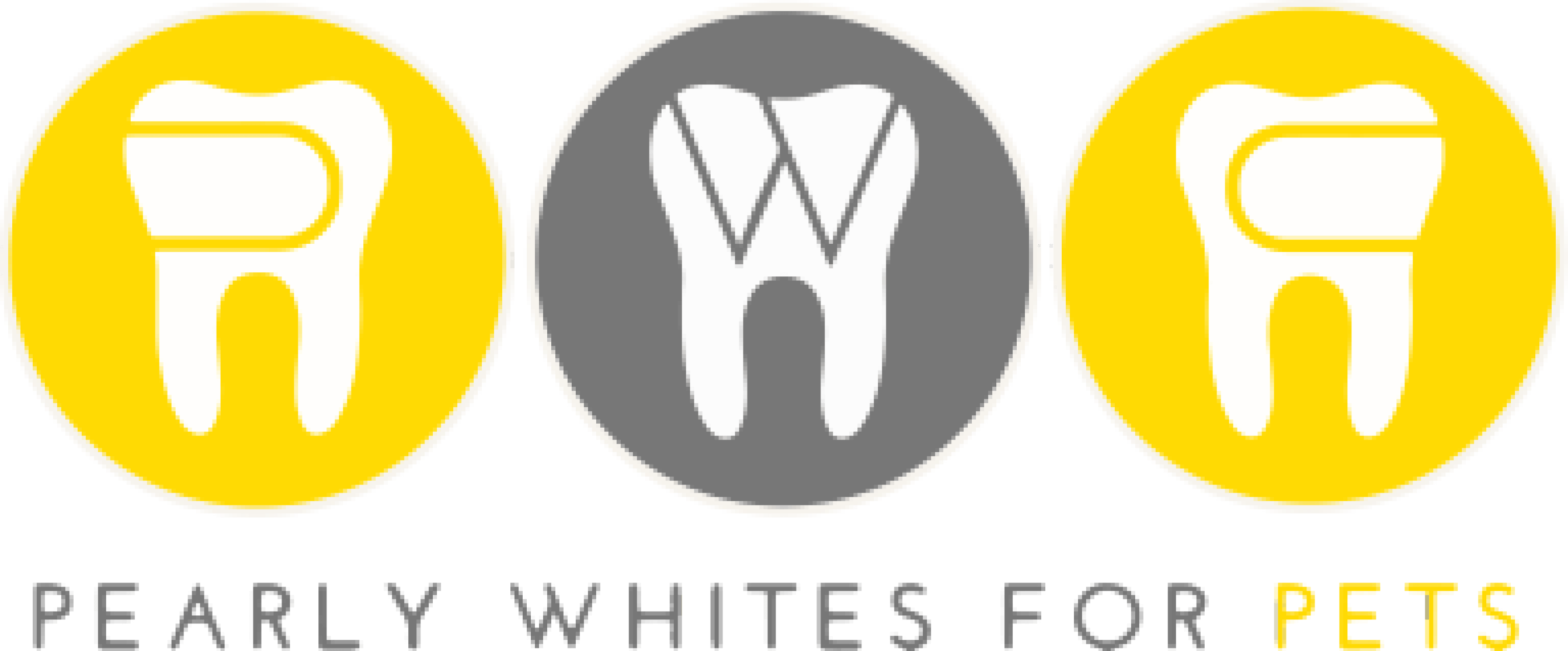
Does your dog get in your face for some loving and you think to yourself “I really need to start brushing my dog’s teeth”? Do you dismiss it as just a dog thing and then forget about it … until the next time?
If your dog has chronic bad breath, known as halitosis, it requires your attention. While dog’s mouths do not typically smell like breath mints, they should not smell like something died in there either!
What Causes Bad Dog Breath?
Just like in humans, bad breath is most commonly caused by poor oral hygiene. The accumulation of plaque and tartar on teeth can lead to bacteria in the mouth that lives in the biofilms that cover all oral surfaces and causes bad breath. If you are not regularly brushing your dog’s teeth and tongue, or if you are not using other methods of home care to support their oral hygiene, plaque build-up is likely the culprit for their bad breath.
Many dog owners make the mistake of dismissing their dog’s bad breath as a normal thing for a dog. But too much plaque and tartar can start to push the gums away from the teeth, exposing areas for bacteria. Gum disease, which is progressive and starts as gingivitis, advances as plaque build-up, and results in periodontal disease, is the leading health issue affecting adult dogs. Gingivitis, evident from a thin red line on the gum line where it meets the teeth, causes inflammation which leads to gum tissue damage and will progress further if left untreated. In worst case scenarios, breakdown of the jawbone can eventually occur, resulting in lost teeth. Dental disease causes severe halitosis and affects other organs in the body. Studies have shown that periodontal disease has been linked to heart, liver and kidney disease in dogs. Chronic bad breath is definitely not something to ignore.
What is Halitosis?
Halitosis is, simply put, seriously bad doggie breath! But it is important to understand that halitosis is a symptom of an underlying medical condition. Halitosis can only be cured by finding and addressing the underlying cause.
While halitosis can be caused by poor oral hygiene, there are other common issues that can contribute to bad dog breath. Dogs who like to chew sticks, toys and/or ropes are at a higher risk of getting part of what they chew stuck between their teeth or lodged in their gums. If this foreign body goes undetected, it has the potential to cause an infection in the mouth, a symptom of which is bad breath.
Many dogs are infamous for getting into the trash, eating things they shouldn’t. We regularly throw away food waste, including things like chicken skin or rib bones which are appealing to dogs. If these things have been in the trash for a few days, they are already decomposing and essentially your dog is eating rotten food. This most certainly leads to bad breath, not to mention a bad stomach ache.
Some dogs like to eat poop – disgusting but true! While some dogs eat their own poop, others prefer the poop of other animals – anything from rabbit poop to goose poop to cat poop, the latter of which is most common as many households have both cats and dogs. Called Coprophagia, eating poop is caused by behavioural, physical or medical reasons and needs to be addressed accordingly. Coprophagia most definitely causes halitosis and will result in the denial of doggie kisses from owners everywhere!
While bad breath is not breed specific, smaller dog breeds and Brachycephalic dogs are more prone to halitosis because they are more likely to have gum disease. This is due to anatomical factors that contribute to crowded and crooked teeth (and would require another Blog post for proper explanation; we are working on it -coming soon).
More Serious Causes of Bad Dog Breath
While poor oral hygiene is the most common cause, halitosis can sometimes be caused by more serious health issues. Periodontal disease is a leading health concern in dogs, but the following health issues are also culprits and need to be diagnosed promptly by a veterinarian.
- Kidney Disease: Toxins called urea build up in the bloodstream of a dog affected by kidney disease. The urea can cause a dog’s breath to smell like urine or ammonia. Too much urea can cause ulceration in the mouth and must be treated. Kidney disease is a serious medical condition.
- Diabetes: If your dog’s breath smells sweet or fruity, and if you notice they are drinking and urinating more frequently, this can be an indication of diabetes. This is a treatable health condition.
- Liver Disease: Severe halitosis, combined with yellow-ish gums, can be a sign of another serious medical problem with the liver. Typically, your dog will exhibit other issues like a lack of appetite and vomiting if they have liver disease.
What Can I Do About my Dog’s Bad Breath?
The most obvious answer is to maintain and support your dog’s oral health. The best way to do this is through a combination of regular veterinary care, home care that includes an oral hygiene routine and supplemental things such as dental toys and treats, water additives and supplements that promote the health of both the oral and gut microbiome. If your dog is a candidate for toothbrushing at home, make sure you use a toothpaste formulated for dogs. They come in many flavours, one of which your dog will love, making the experience more enjoyable for you both. If you are interested in learning about the many ways you can support your dog’s oral health, please read our previous Blog post “Maintain Your Pet’s Pearly Whites from Home”.
Make sure you keep your trash out of reach from your dog. If you have a cat, ensure your dog does not have access to their litter box. Keep a close eye on your dog while you are out walking as people often discard things on lawns and sidewalks that dogs can easily reach. This includes animal feces too. How many times do we curse owners for not picking up their dog’s poop? You do not want your dog taking care of that with their mouth!
Be sure to feed your dog a quality, balanced diet. If your veterinarian is concerned about their oral health, there are many dental-focused diets for dogs. Do your research and find the formula best suited for your dog. Feeding your dog dental treats that are made to support oral hygiene will also help to keep your dog’s mouth clean and their breath fresh.
Ultimately, you know your dog best. It is important to give your dog a regular check-up with a veterinarian for a proactive approach to maintain their overall health. Regular check-ups must include your dog’s mouth as well, in order to prioritize preventative dental care. In partnership with Veterinary care, regular teeth cleaning by a professional practitioner will help to maintain good oral hygiene for your dog. Oral health is strongly connected to gut health, which, in turn, is responsible for your dog’s overall health and well-being, so don’t ignore the big picture. Combination care is the best care.
You can read more about the connection between gut and oral health on our Blog here.
